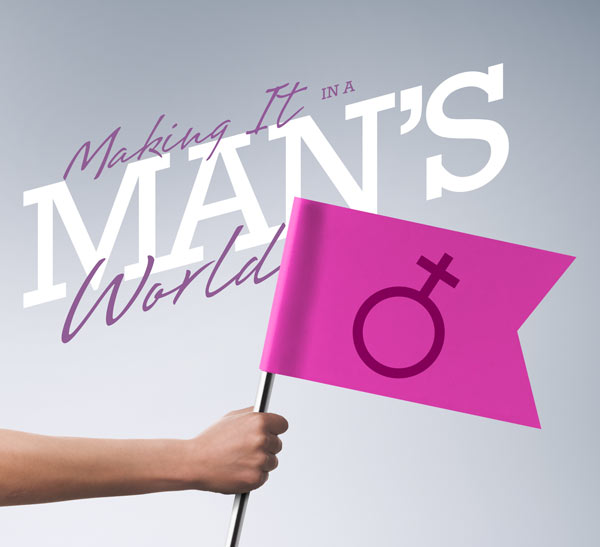
Stereotypes persist for a number of reasons, and while they are often unfair, let’s face it, they can also ring true.
For example, it’s just a fact of life that more women become nurses than men do. Although women love horses, there are far more male jockeys than female jockeys riding at the top level. Some men make fabulous teachers, but you won’t find many when you visit your local elementary school.
When it comes to male-dominated careers, it takes determination and perseverance for a woman to succeed, but the reward can be great and the satisfaction level high. We visited with five local women who enjoy jobs that are typically held by men to find out how they chose their line of work and what it means to them.
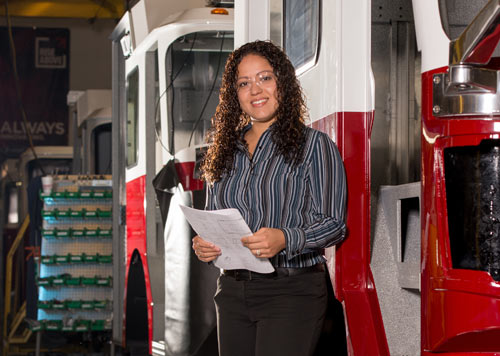
Fire Apparatus Mechanical Design
Alicia Rioseco
When most women talk about design, it has to do with fashion. For Alicia Rioseco, it’s all about fire trucks, or “apparatus,” as the vehicles are known in the industry.
A Florida native who graduated from Belleview High School in 2003, Alicia, now 29, originally had her heart set on a career in architectural design. Her senior year of high school was spent in the Career Academy at College of Central Florida (then CFCC), but she had a hard time finding an internship in architecture, which was a graduation requirement. Then, she learned about an internship opportunity in mechanical design at E-ONE, the internationally known manufacturer of fire and emergency vehicles in Ocala.
After interning, she worked at E-ONE part time while completing additional college courses and came on full time later in 2003. Today, she is a product designer in the engineering department and works on custom truck design as well as aircraft rescue firefighting vehicles (ARFF), the “biggest, baddest” trucks they produce.
“About 60 percent of my time is design, creating blueprints for production, and the rest is problem solving,” says Alicia, who focuses heavily on cab design.
“We get orders from sales and go through it part by part to create what is needed based on what the customer wants. Whenever production has issues working on a project, I troubleshoot and problem solve with them. I help explain things, find solutions and make sure we’re all on the same page.
“I appreciate the people on production who’ve been there a long time and know so much,” Alicia adds. “I’m not only a female but also younger than most of the people here. In the beginning, I noticed some of the guys tried to help me a little bit more, but over time they realized I knew what I was doing.
“One important thing I feel has helped me succeed in a mainly male-dominated career field is that if you are determined to produce the highest quality of work and maintain a great attitude, you will gain the respect of your co-workers,” she says.
Alicia wears business casual attire to work, so she looks professional if she has to meet with a vendor or customer, but when she heads downstairs to the production line, she has to put on steel-toed shoes, safety glasses and pull her hair back.
Her favorite part of the job? Creating something from nothing.
“When a customer has a request of what they want and I get to create it, that’s what I like best,” Alicia says. “Working here, you get to see every part of a project. I see the sales request, create all the blueprints and models and then see it come to life as it’s created. I can ‘baby’ a project all the way through from plan to finished product; that’s pretty neat!”
Married for seven years to Miguel Rioseco, a firefighter with Marion County Fire Rescue (they met as teens at Career Academy), Alicia and her husband recently became guardians of her 16-year-old niece.
One of six kids in a close-knit family, Alicia is glad to remain in Marion County. In her free time, she enjoys playing golf and riding her motorcycle. She also loves barbering and cutting hair for friends and family.
“They’re guinea pigs and can’t complain since they don’t pay!” she laughs.
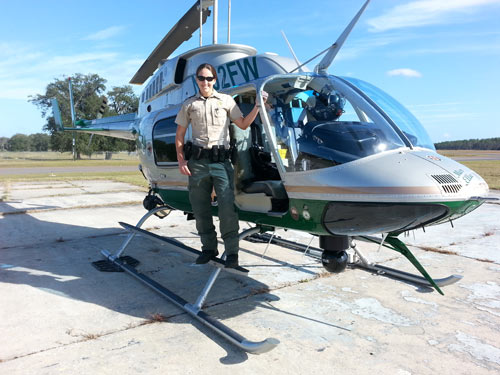
State Wildlife Officer
Cara Russo
Carolyn (“Cara”) Russo has always felt at home in the woods, so her job as an officer with the Florida Fish and Wildlife Commission (FWC) is a natural fit. Growing up in Citrus County, Chassahowitzka to be exact, she was one of three sisters raised by a single mom.
After graduating high school in 2007, Cara wasn’t sure which direction to take, although she was intrigued with the idea of a career in law enforcement. Unsure what FWC officers actually do, she did some research and decided it sounded like a great choice for someone who loved being outdoors.
Even though only a small percentage of Florida’s FWC officers are women, Cara, 25, feels quite comfortable in uniform and carrying a weapon.
“I think sometimes when you have two men (confronting each other), there tends to be more ‘bowing up.’ You’ll have some people give you an attitude, but they know they can go to jail,” says Cara, adding that she’s gained confidence and gotten braver since starting in the field in 2009.
FWC officers are federally deputized, so they are able to enforce federal laws dealing with protecting threatened and endangered species as well as go offshore and enforce commercial fishing laws. As certified law enforcement officers, they also have the power to stop a motorist for a vehicle violation, such as running a light or driving under the influence.
Officers tend to work alone and while Cara says she hasn’t had too many bad situations, there have been moments when she’s had to be more cautious than others.
“It can be dangerous working by yourself, especially in a big county like Levy, when your backup could be 45 minutes away. You can be in the middle of the woods or out on the water, and it can take a long time for backup to get to you,” says Cara, who has run into her share of ‘good ol’ boys’ and marijuana grow sites in the woods.
This past hunting season, Cara and another officer were on the trail of someone who had illegally shot a doe in a state management area. Knowing that what he was doing was against the law, the man shot the doe and covered her body with brush. Cara and the other FWC officer knew he’d return, so they split up and waited in the woods. Sure enough, the man had someone drop him off and he snuck back to the deer’s body. Once he began cleaning the deer and cutting up the meat, the officers came out of hiding and confronted him, and he tried to make a run for it.
“My heart was pumping chasing him through the woods because you don’t know who you’re dealing with,” recalls Cara. The story ended with the man in custody. In cases like this, when a deer is taken illegally, the venison is donated to a local charity or animal rescue facility that can use it so the meat doesn’t go to waste.
One thing Cara appreciates about her job is that there’s no such thing as a “typical” day. Her shifts vary, and night shifts are often busy, thanks to such illegal activity as night hunting or shooting deer off the road.
“Because of what we do, one day we could be on a boat; another day we could be on an ATV or walking through the woods. Hunting seasons dictate a lot of what we do, including checking licenses and handling calls about people who are trespassing, poaching and shooting across the road. After hunting season, we spend a lot of time on the water checking licenses, legal size and bag limits as well as boating safety. We go out on a variety of different boats in the Gulf and on rivers.”
Search and rescue cases are common, both on the water and in the woods. One rescue with a happy ending occurred when a small plane went down in LakeOkeechobee.
“The people survived; they were standing on top of the plane when we got there in an airboat to rescue them,” recalls Cara. “Always carry GPS because that can be a lifesaver for us trying to find you!”
Cara comes across plenty of wildlife, some friendlier than others. Working the Gulf Hammock management area, she saw at least 20 pygmy rattlers in one day. Another time, she had a fawn in her front seat; the mother had been killed and Cara was taking the baby to a rehab facility.
“I love my work and am glad I found it,” says Cara. “You meet all different kinds of people and see a lot of things. Part of our job is exploring what’s out there.”
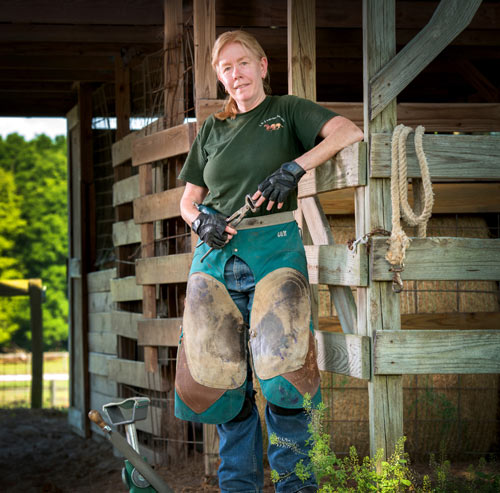
Farrier
Lana Haven
Most professionals in the physically demanding field of farrier work are men. Lana Haven loves being an exception.
Raised in the Florida Panhandle, Lana was a horse-crazy kid who started competing in rodeo at the age of 14. She ran barrels and did trick riding, but she also entered bareback bronc riding.
“I just looked at the boys riding and thought, I can do better than that,” Lana remembers. “Back then girls were allowed to ride rough stock with two hands, but I rode one-handed like the boys.”
Lana got into her line of work unintentionally. Once she was rodeoing for a living, she realized she was lucky to get a farrier to show up when scheduled. Since her success in the rodeo arena depended on having her horse well shod and ready to run, she decided to do it herself. So, in 1979, she headed to the Oklahoma Horseshoeing School, went through the course and earned her certification.
After that, some of the cowboys began bringing their horses for her to shoe when she was at a rodeo.
“I had a good barrel horse at the time, one of the best in the Southeast, and some of the ropers asked me to reset and shoe their horses. They wouldn’t stick around while I did the horses because they didn’t want to admit a girl was shoeing their horse and doing a darn good job of it!”
After Lana quit rodeoing professionally in 1987, she became an active duty officer in the U.S. Air Force and served from 1987 to 1994, including both Desert Storm and Desert Shield.
After serving her country, Lana was raising champion Paint horses and continued doing her own shoeing. Although she never intended to do farrier work for the public, she began getting more and more client horses.
“Whatever you do to the bottom of the horse’s foot will affect his skeletal system all the way up. It’s similar to your car’s tires and alignment; if they’re wrong, it’s going to affect everything,” explains Lana. “You have to know body mechanics because you can create issues down the road if you don’t know what you’re doing. Balance and alignment make a huge difference, especially with old or rescued horses.”
The work is physically demanding and can be dangerous. Lana has had both feet broken (fortunately not at the same time!) as well as a number of cuts that required stitches. She wears chaps, knee protectors, tarsal protectors and half gloves when working. Staying strong with a well-developed core helps prevent back soreness, she’s found.
Lana, who has been in the Ocala area since 1995 works by referral doing therapeutic, pathological, natural balance and performance shoeing, and trimming. A professional farrier for 35 years, she appreciates how the industry has changed over the years and the wide range of materials and types of shoes now available.
“The bias against women farriers isn’t as bad now as it was even 20 years ago, when my sexuality was called into question even though I’ve been happily married over 20 years,” she notes.
Although she’s hired by the owners, helping the horses is the best part of Lana’s job.
“I love working with horses that have had acute lameness and making their lives better. Doing something to enhance the lives of these magnificent animals is a good thing. I love to see the relief on the faces of the horse and the owner. Improving quality of life is what gives me joy.”
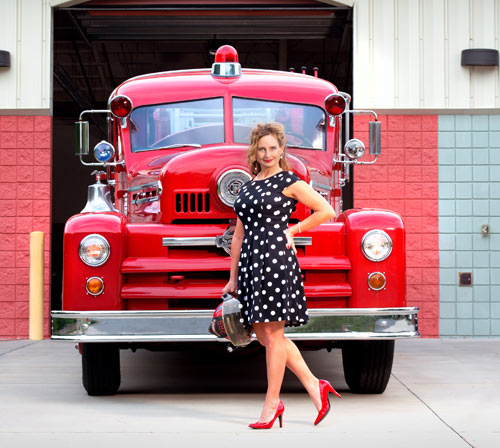
Firefighter
Captain Roseanne Moreland
It wasn’t like Captain Roseanne Moreland ever dreamed of being a firefighter. That career had never even crossed her mind until a customer at the feed store where she worked as a teenager mentioned it.
“Originally, I wanted to go to school for horticulture,” says Roseanne, who grew up in Lake County and moved to Ocala after high school. “I was working at a feed store loading flat bed trucks when one of the customers said, ‘If you’re going to do this kind of heavy manual labor, you should go to fire college and make a career out of it.’ He even brought me an application.”
Intrigued, she completed the application and was accepted. She went through the fire college in Ocala, graduated and was hired by the Ocala Fire Department in March 1989. She was just 19 years old.
“I literally grew up in the fire department. It’s been my second home,” says Roseanne, now 44, who has been a Captain since 1997 and is one of just six women firefighters on the Ocala Fire Department roster.
The physical demands of the job can be grueling. The weight of gear alone is over 50 pounds… and that doesn’t take into account dragging heavy hoses, maneuvering equipment and simply wearing full gear in blistering heat. A firefighter must also be able to remain calm and think clearly in the midst of great distraction and potential danger.
But it goes far beyond the physical, Roseanne notes.
“God has led me down this path, and my faith has kept me confident. It’s a big part of being in this line of work. You have to have a stomach for this type of work. We sometimes see horrific things. We’re there to pick up the pieces, and that affects firefighters mentally and emotionally. We see things most people never see, and over time, these things stay with you and affect you.”
Firefighters work 24-hour shifts and rotate on 24 hours, off 48 hours. Roseanne, who is divorced and has a 15-year-old daughter, works out of fire station 6 on Highway 200. As a captain, she’s responsible for anywhere from two to five personnel and up to three trucks as well as the station itself. All equipment must be meticulously maintained and ready to go at a moment’s notice. After all the necessary details are handled, she says the next question is usually, “What are we going to eat?” There’s truth to those rumors about firefighters being good cooks, she laughs.
Working in a male-dominated field brings constant challenges, but Roseanne doesn’t expect to be treated differently because she’s a woman, and she enjoys being part of a team effort. She does get a kick out of the fact, however, that the guys she works with are always surprised when she puts on makeup and “women’s clothes” for a meeting or event. They’re used to seeing her in uniform, with no makeup and her hair in a ponytail.
After 25 years as a firefighter, Roseanne remains happy with her career choice.
“It’s been a blessing. I still enjoy the work after all these years. I enjoy the caring and compassion and helping people. That’s the reward, because the pay is not there for what firefighters do in general, just like teachers’ pay.”
She also is grateful for those occasions when she learns “the rest of the story.”
“We usually don’t find out the outcome when we help someone who’s severely injured, so it makes me feel appreciated when later they take the effort to make calls and find out who was on the truck that day who helped them. We have people who come back to thank the emergency responders and some even bring cookies. Then, we get to talk to them and get the whole story,” says Roseanne. “The most rewarding part of the job is when you make a difference in someone’s life and they show appreciation.
“People don’t usually think about the fire department until they need help or have benefited from our service,” she adds. “Holidays, 24/7… it doesn’t matter, we’re always working, and we still make house calls!”
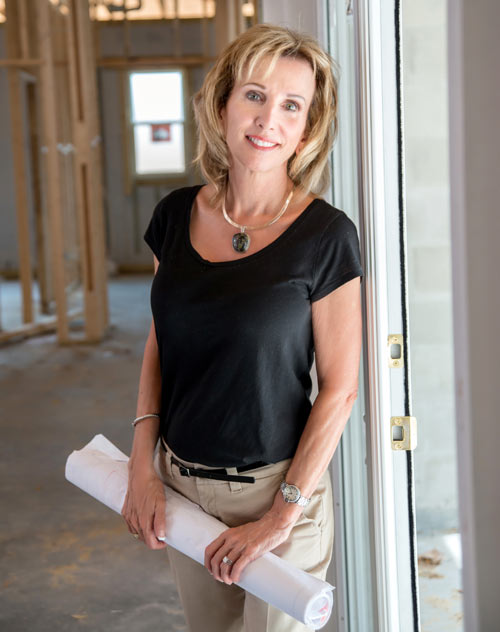
Construction Business
Debbie Klugger
When people think of construction, they tend to think of men. Not that a woman can’t read a set of blueprints as well as a man, but the stereotype prevails. That’s exactly what Debbie Klugger ran into when she started in the construction industry 30-plus years ago.
In her 20s, Debbie was hired by a large development company that offered residential and commercial construction and design, roofing, custom building and real estate. Debbie began in sales, working her way up to vice president of the company before starting Center State Construction in 1988 with then-husband Jim Klugger.
Today, Debbie and her son, Josh Klugger, run the company, which has built over 1,000 homes in Marion, Citrus, Levy, Lake and Alachua Counties.
When she started in sales, she found some male clients often didn’t want to deal with her because they assumed she wouldn’t know as much as a man.
“I decided I needed to be as smart and know as much—if not more—than the men I worked with,” recalls Debbie. “I remember one man apologizing to me after I went over his blueprints with him because he realized I knew what I was talking about.”
She laughs when telling the story of how one client arrived for his meeting and asked her to get him a cup of coffee.
“When I brought him his coffee, he said, ‘I owe you an apology. That’s your name on the front door, isn’t it?’” says Debbie, adding with a smile, “It’s always better to be underestimated!”
Although she’s never had to swing a hammer, she’s put in plenty of hours in the field doing walk-throughs, making design tweaks and meeting with customers to review plans.
Today, she spends more time in the office than on building sites, so her daily attire is “business casual.” Her position is that of COO (chief operations officer) and advisor, as Josh is company president and they collaborate on running the office. A typical day may include reviewing sales, going over insurance details, discussing budgets and financials, and strategic planning. She enjoys the diversity and the fact that her work is never boring.
“We’re known for architectural design twists and tweaks that set us apart from other builders,” notes Debbie. “We have a book of floor plans people often use, but we also do custom homes. We make it a point that most things are included in the standard price and aren’t extras, so the customer isn’t disappointed and spending more than they expected.”
She’s well aware of the fact that what is everyday work to her is often a once-in-a-lifetime experience for her customers.
“It’s really exciting to help people realize their dreams,” says Debbie. “A home purchase is usually the largest purchase of someone’s lifetime, so it’s rewarding to be a part of that.”






